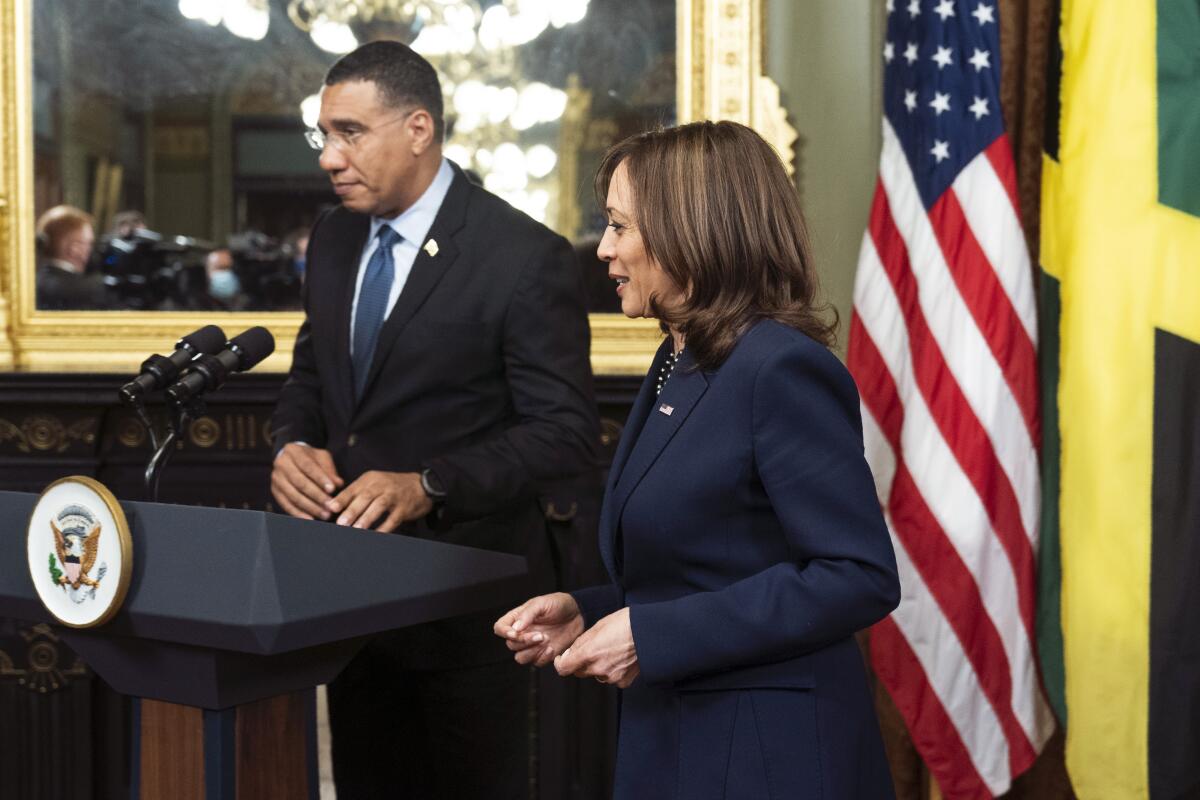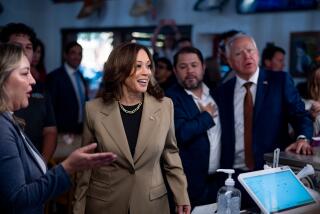Kamala Harris, daughter of a Jamaican immigrant, meets with island’s prime minister

WASHINGTON — Vice President Kamala Harris — whose father emigrated from Jamaica — met Wednesday with the island nation’s prime minister, Andrew Holness, at the White House, marking another historic moment for the first Black and South Asian vice president.
The meeting was the first time since 1995 that a Jamaican leader has visited the White House.
Harris, in brief remarks during a photo opportunity with reporters, noted her Jamaican descent and trips to the island in her childhood as she welcomed Holness.
“We are acutely aware of the interconnection and interdependence between the United States and Jamaica,” Harris said, adding that she shared a “history with millions of Americans who have their roots through the generations in Jamaica.”
Holness said that Harris has been “a source of inspiration and great triumph for many in the Caribbean, in particular our young women in the region.”
Harris has had little known contact in recent years with her father, an 83-year-old Jamaican-born economist named Donald J. Harris, who was divorced from her mother, Shyamala Gopalan, when she was a young girl. He criticized Harris publicly in 2019 when she made a joke about her heritage playing a role in her smoking pot when she was in college.
Harris does not mention Jamaica often in public but visited relatives there as a child. She wrote in her memoir that her late mother, who was born in India, raised her and her sister, Maya, as “black girls,” with the understanding that they would be viewed that way in the U.S.
Though her strained family relations have complicated Harris’ connection with her father’s homeland, her ascension to the vice presidency has been greeted with pride in Jamaica, a Caribbean nation of about 3million people with strong cultural and economic ties to the U.S.
“I know she doesn’t make a big deal of it, but, as you can imagine, small countries make a big deal of any sort of global exposure or connection,” said Damien King, an economist who is the executive director of the Caribbean Policy Research Institute in Kingston, Jamaica.
Though Holness’ visit was the first by a Jamaican leader to the White House in nearly three decades, he and other Caribbean leaders met with then-President Trump in 2019 at his residence in Palm Beach, Fla. Then-President Obama visited the country in 2015, and Trump’s secretary of State, Mike Pompeo, went there in 2020.
Wednesday’s meeting commemorated the 60th anniversary of diplomatic ties between the countries. Harris said the two leaders discussed new efforts to help Jamaica recover from the COVID-19 pandemic, crime prevention efforts, the environment and Russia’s invasion of Ukraine.
Though Caribbean nations were divided over how to relate to the U.S. during the Trump presidency, Jamaica maintained its close ties. Some Caribbean leaders boycotted Pompeo’s speech because of the administration’s hard line against Venezuela and its immigration policies. For its part, the Trump administration took issue with Jamaica’s increasing economic ties with China, which has built several infrastructure projects in the country as it seeks to broaden its global influence.
The Biden administration is also wary of China’s growing influence but has not spoken out as aggressively. King said that he believes Jamaica is trying to balance those concerns with its need for economic investment, and that its leaders are pressing the administration for help in shoring up ties between American and Jamaican banks.
“My feeling is that the thinking is purely economic and pragmatic rather than trying to play geopolitical game theory,” King said. “Jamaica has given no indication of wanting to jeopardize its long-standing warm and close relationship with the United States.”
The same may not be true of its ties to Britain. Holness told Britain’s Prince William and his wife, Kate, during a tense meeting in Jamaica last week that his country wants to be fully “independent” from the United Kingdom. Though the former colony gained independence from British rule in 1962, Jamaica still recognizes the queen as its sovereign head of state.
More to Read
Get the L.A. Times Politics newsletter
Deeply reported insights into legislation, politics and policy from Sacramento, Washington and beyond. In your inbox three times per week.
You may occasionally receive promotional content from the Los Angeles Times.











